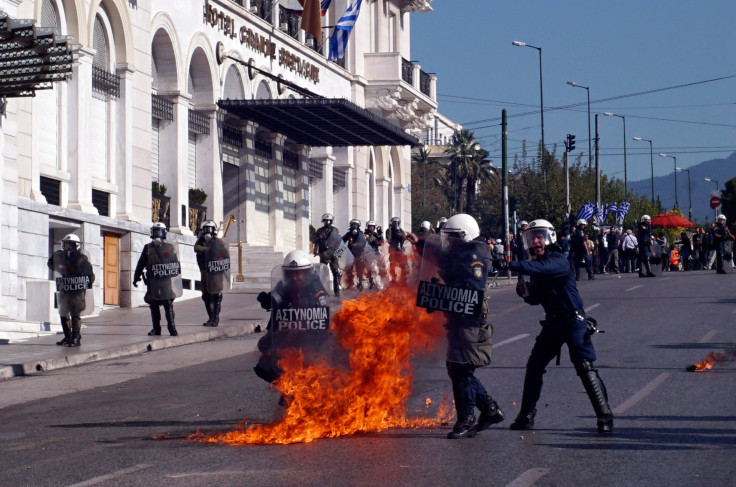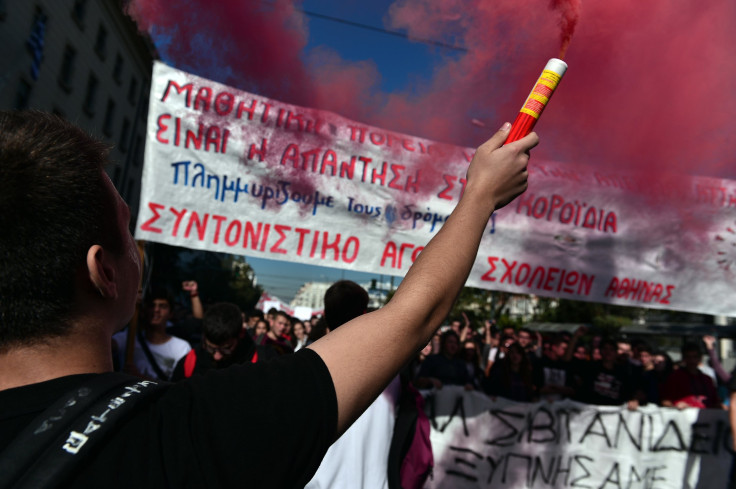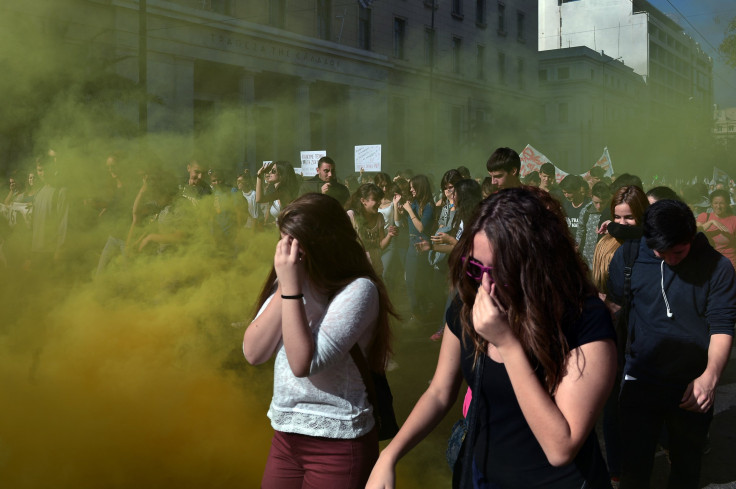Greece Anti-Austerity Protests 2015 Video, Photos: In Athens, Riots Break Out, Tear Gas And Molotov Cocktails Exchanged During Greek Strike
Greek protests turned violent in Athens Thursday while international leaders discussed the latest round of budget and pension reforms in the debt-ridden country, angering workers who say the changes are unfair. The southern European nation has been suffering under strict austerity measures, such as reduced social spending and higher taxes, for the past five years, and the top two workers' unions in the nation organized the protests as a way to push back against the ruling government.
The unpopular austerity measures, including pension cuts, budget reductions and deep slashing of social services, were exchanged for cash bailouts from European lenders following a continent-wide recession in 2008 that sunk the euro and sent national deficits soaring. Greece has struggled to recover from its debts, particularly after a second economic downturn in 2011.
The protests drew thousands of people, as flights were grounded, stores closed, and life in Athens all but skidded to a halt. At one point youth protesters split from the rest of the strike and threw molotov cocktails made with petrol at the Bank of Greece as well as at government buildings. They also looted several local stores.

Clashes break out in Athens during first general strike against left-wing Syriza government https://t.co/qG7lvsZlAJ pic.twitter.com/wR9dFxDFGu
— Telegraph News (@TelegraphNews) November 12, 2015Clashes briefly broke out between riot police and youths in Greece during a general strike. https://t.co/Gt8MTl2nvl pic.twitter.com/MkxuVIEMFM
— The Boston Globe (@BostonGlobe) November 12, 2015Clashes break out as Greek workers strike against austerity measures https://t.co/Gyh4oPB00q pic.twitter.com/4x16921OVU
— Business Insider (@businessinsider) November 12, 2015The austerity measures have angered many Greek people who say the belt-tightening has made daily life impossible, spurring support for anti-austerity parties or groups. The current government, led by the Syriza party with Prime Minister Alexis Tsipras at its helm, initially rose to power in January by campaigning on an anti-austerity ticket. Tsipras accepted an unpopular third bailout in July shortly after arriving in office, however, causing many of his supporters to feel betrayed by the turnaround.
After resigning from office in August, Tsipras campaigned once again on behalf of Syriza in September, returning to his position as prime minister following a snap election. Support for Tsipras has remained low as Greek citizens were losing faith in his ability to stand up to European creditors.


The protests were the first general strike of the year and drew thousands of people, though the exact numbers were not immediately available. Protesters of all ages, from students to pensioners, participated in the demonstration.
"My salary is not enough to cover even my basic needs. My students are starving," Dimitris Nomikos, 52, a teacher in Athens told Reuters. "They are destroying the social security system ... I don't know if we will ever see our pensions," said Nomikos.
Μολότοφ στη τράπεζα της Ελλαδος pic.twitter.com/ZmSLps7yGB
— Makis Sinodinos (@MakisSinodinos) November 12, 2015Clashes continue in Athens in front of the #Parliament #Greece #apergia @BILD pic.twitter.com/LJmi04XX34
— Liana Spyropoulou (@LSpyropoulou) November 12, 2015© Copyright IBTimes 2024. All rights reserved.






















